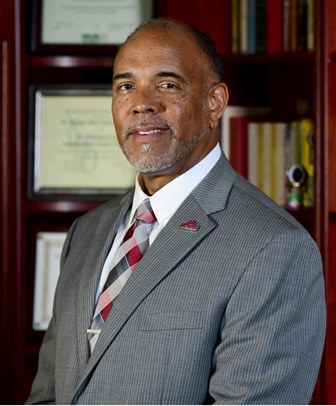
Dr. Marshall F. Stevenson to serve on reconciliation commission
Wednesday, August 21, 2019
Dr. Marshall F. Stevenson Jr. (dean, School of Education, Social Sciences & The Arts) will represent UMES on the newly formed Maryland Lynching Truth and Reconciliation Commission.
The 2019 Maryland legislature created the panel to investigate the state’s history of vigilante acts between 1854 and 1933. The commission is charged with generating a report addressing how the state should publicly reconcile at least 40 known unlawful acts.
Maryland’s four historically black universities have a representative on the commission. Stevenson joined UMES’ faculty a year ago after working in a similar capacity at Delaware State University, where he was a member of the advisory board that created the Delaware Museum on African American history.
“The creation of the Maryland Lynching Memorial Project comes at a critical time in the history of the state and the nation,” Stevenson said. “It coincides with the commemoration of 400 years of enslavement and the struggle for freedom waged by African-Americans, as well as the national political debate on reparations because of that enslavement.”
After an organizational meeting earlier this month to select an acting chairman, the commission will get down to work Sept. 12 at the University of Baltimore. Author/educator Sherrilyn Ifill, president and director-counsel of the NAACP Legal Defense and Educational Fund, Inc., will serve as a guest speaker. She published a widely acclaimed book in 2007 examining the nation’s shameful history of lynching.
Maryland Del. Joseline Pena-Melnyk (D-Prince George’s/Anne Arundel counties) was chief sponsor of the legislation creating the commission, which garnered unanimous support.
At the Aug. 12 organizational meeting, Pena-Melnyk said, “we have never really looked at … the facts. This commission is going to hold hearings and regional hearings throughout the state of Maryland where these lynchings took place.”
The last known lynching in Maryland chronicled by newspaper accounts took place in Princess Anne and involved George Armwood in 1933.
Stevenson said he’ll be talking and listening to other commission members about whether the panel should convene a fact-finding session in Princess Anne or in nearby Salisbury, which was the site of three lynchings.
Between 1854 and 1933, historians have found evidence at least 40 lynchings were recorded across Maryland. Pena-Melnyk’s law noted that no one ever faced charges in connection with those acts, and government officials often looked the other way.
“The current state of race relations, racial violence and the resurgence of white supremacy in the United States makes the recognition and memory of lynching more relevant than ever,” Stevenson said.
Assisting the commission will be a state archivist as well as a staff member from the Maryland attorney general’s office, which has the authority to subpoena witnesses or documents.
The panel must submit an interim report to the legislature and governor by September 2020. A final report is due December 2021.
“The idea is to learn from our history, especially given what’s happening in the U.S. right now,” Pena-Melnyk said. “We need to have a frank discussion about racism and about different cultures and respect them.”
Information from an Associated Press dispatch was used in compiling this report.

